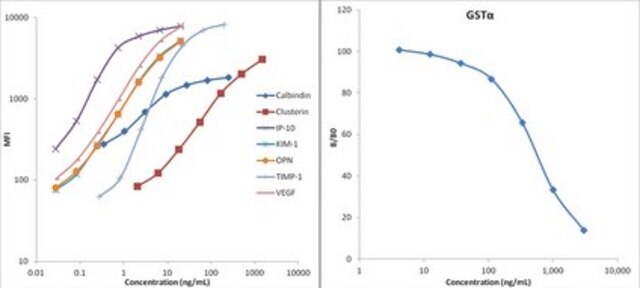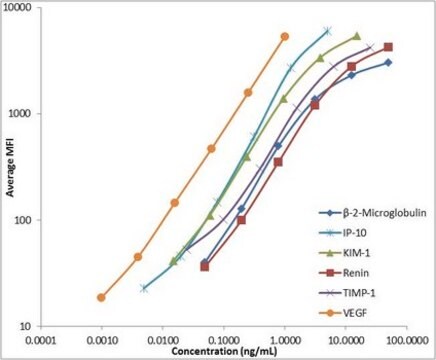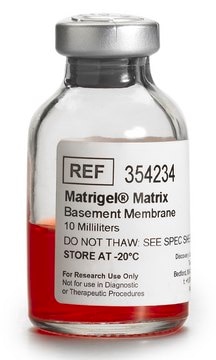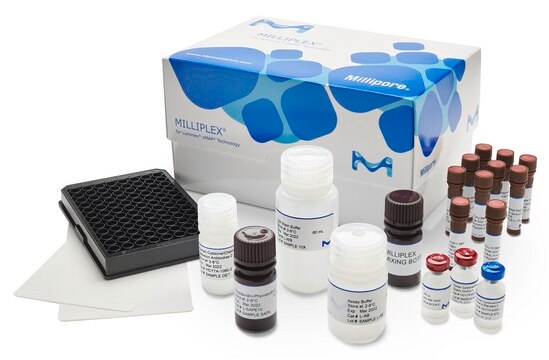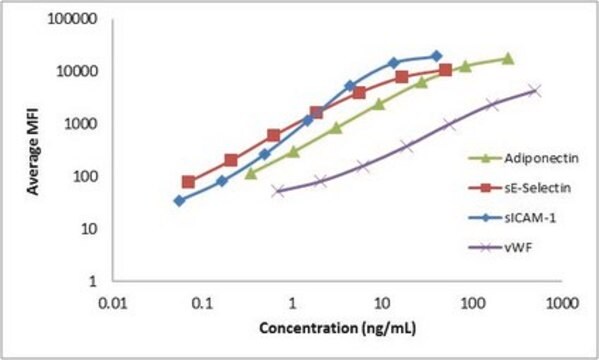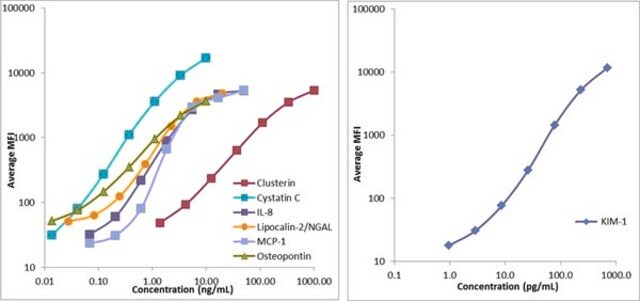RKTX2MAG-37K
MILLIPLEX® Rat Kidney Toxicity Magnetic Bead Panel 2 - Toxicity Multiplex Assay
The analytes available for this multiplex kit are: Albumin, AGP, ß2M, Cystatin C, EGF, Lipocalin-2/NGAL.
About This Item
Produits recommandés
Niveau de qualité
Espèces réactives
rat
Fabricant/nom de marque
Milliplex®
assay range
accuracy: 70-123%
standard curve range: 0.00-2 ng/mL
(EGF)
standard curve range: 0.01-10 ng/mL
(Lipocalin-2/NGAL)
standard curve range: 0.01-8 ng/mL
(Cystatin C)
standard curve range: 0.48-350 ng/mL
(β2M)
standard curve range: 1.37-1,000 ng/mL
(AGP)
standard curve range: 10.97-8,000 ng/mL
(Albumin)
inter-assay cv: <15%
intra-assay cv: <10%
(All other analytes)
inter-assay cv: <20%
intra-assay cv: <15%
(AGP)
Technique(s)
multiplexing: suitable
Méthode de détection
fluorometric (Luminex xMAP)
Conditions d'expédition
wet ice
Description générale
Panel Type: Toxicity
Spécificité
Application
- Analytes: Alpha-1 Acid Glycoprotein (AGP), Albumin, ß2M, Cystatin C, EGF, Lipocalin-2/NGAL
- Recommended Sample type: urine
- Recommended Sample dilution: 1:500
- Assay Run Time: Overnight
- Research Category: Toxicity
Caractéristiques et avantages
Conditionnement
Stockage et stabilité
Autres remarques
Informations légales
Clause de non-responsabilité
Mention d'avertissement
Danger
Mentions de danger
Classification des risques
Acute Tox. 3 Dermal - Acute Tox. 4 Inhalation - Acute Tox. 4 Oral - Aquatic Chronic 2 - Eye Irrit. 2 - Skin Irrit. 2 - Skin Sens. 1 - STOT SE 3
Organes cibles
Respiratory system
Code de la classe de stockage
6.1C - Combustible acute toxic Cat.3 / toxic compounds or compounds which causing chronic effects
Certificats d'analyse (COA)
Recherchez un Certificats d'analyse (COA) en saisissant le numéro de lot du produit. Les numéros de lot figurent sur l'étiquette du produit après les mots "Lot" ou "Batch".
Déjà en possession de ce produit ?
Retrouvez la documentation relative aux produits que vous avez récemment achetés dans la Bibliothèque de documents.
Contenu apparenté
Novel kidney toxicity biomarkers expand options for acute nephrotoxicity detection. Multiplex assays measure multiple renal damage biomarkers in small sample volumes, minimizing time and costs. See how MILLIPLEX® multiplex kidney toxicity assays detected vancomycin-induced subacute nephrotoxicity in rat models.
Multiplex toxicity assays enable researchers to simultaneously measure multiple toxicity biomarkers of various organs to gain a better understanding of toxicity. Explore how MILLIPLEX® multiplex toxicity assays are advancing research on liver injury, kidney toxicity, genotoxicity, and more.
Learn the benefits of using biomarker detection multiplex immunoassays for laboratory, companion, and agricultural animal research and explore MILLIPLEX® multiplex assays for veterinary medicine and animal health research.
Notre équipe de scientifiques dispose d'une expérience dans tous les secteurs de la recherche, notamment en sciences de la vie, science des matériaux, synthèse chimique, chromatographie, analyse et dans de nombreux autres domaines..
Contacter notre Service technique